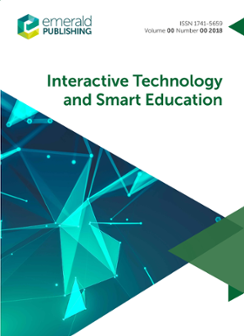Interactive Technology and Smart Education
Issue(s) available: 84 – From Volume: 1 Issue: 1, to Volume: 21 Issue: 4

Volume 21
Volume 20
Volume 19
Volume 18
Volume 17
Volume 15
Volume 14
Volume 11
Volume 9
Volume 8
Volume 6
-
Issue 3 2009
Exploring opportunities for language immersion in the posthuman spectrum: lessons learned from digital agents
Heather Lotherington, Mark Pegrum, Kurt Thumlert, Brittany Tomin, Taylor Boreland, Tanya PobudaTechnologically-enhanced language education has shifted from computer-assisted language learning (CALL) to mobile-assisted language learning (MALL), including the use of…
Using epistemic network analysis to examine how different fantasy contexts affect online gamified class students’ behavioral engagement
Shurui Bai, Khe Foon HewAlthough numerous studies have explored gamification, its effects on student intrinsic motivation and behavioral engagement remain ambiguous. This study aims to address this gap…
Examining learners’ cognitive processes and learning emotions in digital game-based vocabulary learning: evidence from eye-tracking technology and facial emotion recognition
Chun-Chia Wang, Hsuan-Chu Chen, Jason C. HungThis research explored the intersection of cognitive processes, emotions and their impacts on digital game-based vocabulary learning (DGVL) among university students. Recognizing…
Effects of educational technology intervention on creative thinking in educational settings: a meta-analysis
Zeinab Zaremohzzabieh, Seyedali Ahrari, Haslinda Abdullah, Rusli Abdullah, Mahboobeh MoosivandThis study aims to meta-analytically investigate the impact of educational technology interventions on the development of creative thinking in educational settings. In recent…
Nexus of essay writing and computer-assisted language learning (CALL) in English language classroom
Umbreen TariqThis study aims to explore computer-assisted language learning (CALL) activities to improve the English essay writing of Pakistani university students. It highlights the role of…
Effects of jigsaw learning strategy integrated with computer simulations on grade 10 students’ achievement and attitude and their correlations in chemistry
Shimelis Kebede Kekeba, Abera Gure, Teklu Tafesse OlkabaThe purpose of this study was to investigate the impact of using a jigsaw learning strategy integrated with computer simulation (JLSICS) on the academic achievement and attitudes…
Impact of media antecedents on persistence and learning outcomes of MOOC learners
Yung-Ming ChengThe purpose of this study is to propose a research model based on the stimulus-organism-response (S-O-R) model to explore whether social media affordances and media richness as…
From traditional to virtual classrooms: unravelling themes and shaping the future of metaverse education
Alisha Waquar, Sujood, Saima Kareem, Nusrat Yasmeen, Sarah HussainThis study aims to conduct a comprehensive review of scholarly literature on the educational impacts of the metaverse, systematically identifying emerging themes, challenges and…
Enhancing learning in design for manufacturing and assembly: the effects of augmented reality and game-based learning on student’s intrinsic motivation
Amarpreet Singh Gill, Derek Irwin, Pinzhuang Long, Linjing Sun, Dave Towey, Wanling Yu, Yanhui Zhang, Yaxin ZhengThis study aims to examine the effects on student motivation and perception of technological interventions within undergraduate mechanical engineering and product design and…
Investigating in-service teachers’ views on ChatGPT integration
Zeina Hojeij, Mohammad Amin Kuhail, Areej ElSayaryThis study aims investigate in-service teachers’ perspectives on the integration of ChatGPT, an artificial intelligence (AI)-driven chatbot, into United Arab Emirates (UAE…
Do learners exhibit a willingness to use ChatGPT? An advanced two-stage SEM-neural network approach for forecasting factors influencing ChatGPT adoption
Nattaporn Thongsri, Orawan Tripak, Yukun BaoThis study aims to examine the variables that influence learners’ acceptance of chat generative pre-trained transformer (ChatGPT) through the theoretical synthesis of variables in…
A bibliometric analysis on gamifying adult learning: past, present and future trends of learner-centered pedagogies
Fei Ping Por, Christina Sook Beng Ong, Siew Keow Ng, Arathai Din EakThe psychological theory of self-determination postulated that gamification enhances learning engagement by intrinsically motivating learners to undertake tasks spontaneously…
Duality in barriers and enablers of augmented reality adoption in education: a systematic review of reviews
Baraa Albishri, Karen L. BlackmoreThe study aims to identify the key advantages/enablers and disadvantages/barriers of augmented reality (AR) implementation in education through existing reviews. It also examines…
A thousand reasons to hate e-learning: a comparative analysis of empirical data and theoretical considerations pertaining to dissatisfaction with e-learning
Alexander Amigud, David J. PellE-learning has become a polarizing issue. Some say that it enhances accessibility to education and some say that it hinders it. While the literature on the subject underscores the…
Impact of technology on interpreting practice: a review of studies on technology and interpreting practice from2013 to 2024
Venus ChanStudies on technology and interpreting have increasingly explored how technology influences the role and performance of interpreters in their practice; however, there is a lack of…
Researching the use of e-portfolios to promote students thinking in digital age: a qualitative action study
Rida Afrilyasanti, Eko Suhartoyo, Utami WidiatiThrough the action research study, this paper aims to examine how e-portfolios improve students’ critical, reflective and creative thinking as part of higher-order thinking skills…
An intelligent tutoring system for programming education based on informative tutoring feedback: system development, algorithm design, and empirical study
Xuanyan Zhong, Zehui ZhanThe purpose of this study is to develop an intelligent tutoring system (ITS) for programming learning based on information tutoring feedback (ITF) to provide real-time guidance…
ISSN:
1741-5659e-ISSN:
1758-8510ISSN-L:
1741-5659Online date, start – end:
2004Copyright Holder:
Emerald Publishing LimitedOpen Access:
hybridEditor:
- Assoc Prof Pedro Isaias
